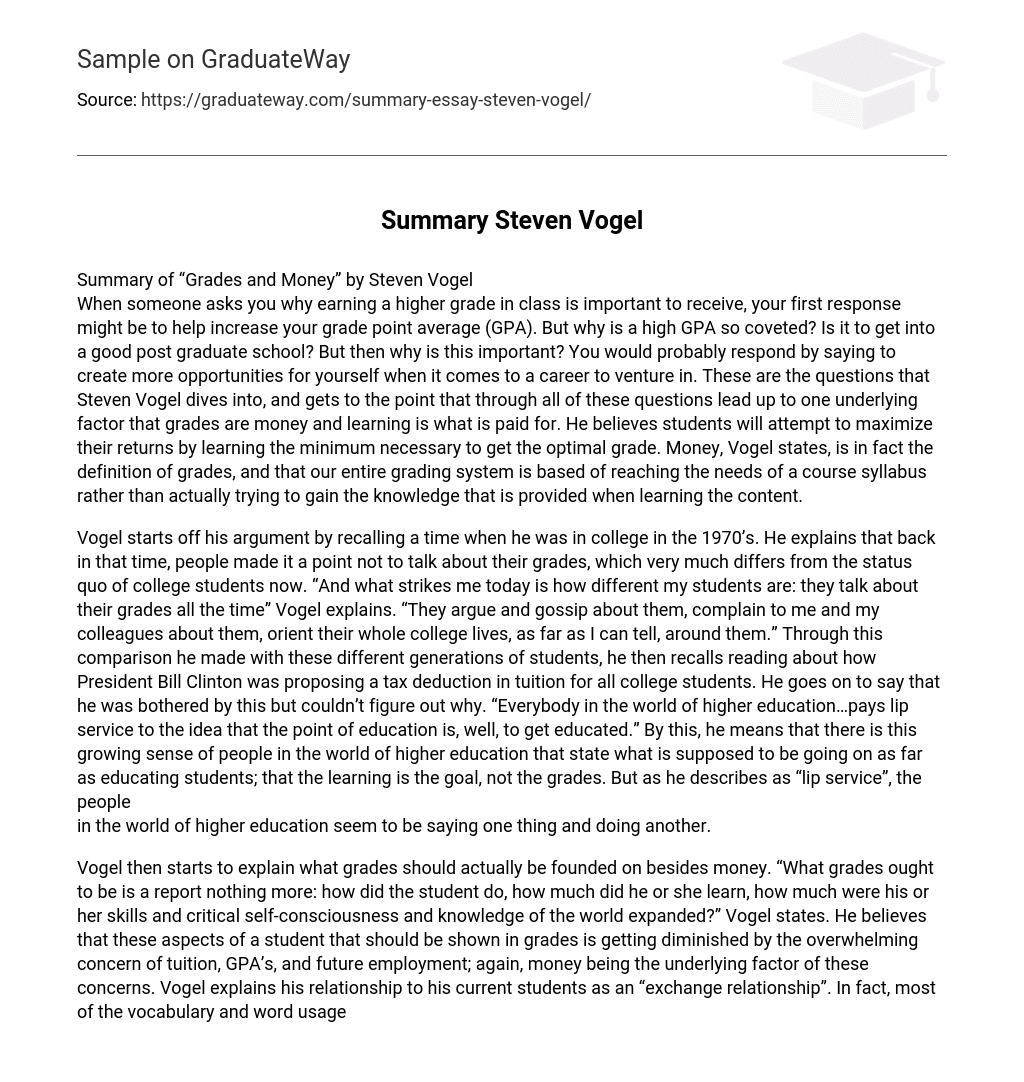Summary of “Grades and Money” by Steven Vogel
When someone asks you why earning a higher grade in class is important to receive, your first response might be to help increase your grade point average (GPA). But why is a high GPA so coveted? Is it to get into a good post graduate school? But then why is this important? You would probably respond by saying to create more opportunities for yourself when it comes to a career to venture in. These are the questions that Steven Vogel dives into, and gets to the point that through all of these questions lead up to one underlying factor that grades are money and learning is what is paid for. He believes students will attempt to maximize their returns by learning the minimum necessary to get the optimal grade. Money, Vogel states, is in fact the definition of grades, and that our entire grading system is based of reaching the needs of a course syllabus rather than actually trying to gain the knowledge that is provided when learning the content.
Vogel starts off his argument by recalling a time when he was in college in the 1970’s. He explains that back in that time, people made it a point not to talk about their grades, which very much differs from the status quo of college students now. “And what strikes me today is how different my students are: they talk about their grades all the time” Vogel explains. “They argue and gossip about them, complain to me and my colleagues about them, orient their whole college lives, as far as I can tell, around them.” Through this comparison he made with these different generations of students, he then recalls reading about how President Bill Clinton was proposing a tax deduction in tuition for all college students. He goes on to say that he was bothered by this but couldn’t figure out why. “Everybody in the world of higher education…pays lip service to the idea that the point of education is, well, to get educated.” By this, he means that there is this growing sense of people in the world of higher education that state what is supposed to be going on as far as educating students; that the learning is the goal, not the grades. But as he describes as “lip service”, the people
in the world of higher education seem to be saying one thing and doing another.
Vogel then starts to explain what grades should actually be founded on besides money. “What grades ought to be is a report nothing more: how did the student do, how much did he or she learn, how much were his or her skills and critical self-consciousness and knowledge of the world expanded?” Vogel states. He believes that these aspects of a student that should be shown in grades is getting diminished by the overwhelming concern of tuition, GPA’s, and future employment; again, money being the underlying factor of these concerns. Vogel explains his relationship to his current students as an “exchange relationship”. In fact, most of the vocabulary and word usage used in Vogel’s article are words that are familiarized in the conversing of money. For example, in paragraph seven he refers to his class syllabus as a “contract”, and even uses the term “docking grades” in relation to a bank contract if you had a late fee. Whereas in this case, he relates it to late work assignments in class. Then Vogel starts to explain the faculty side of this system of “grades being money”. “If grades are money, for us they are funny money, Monopoly money, because it costs us nothing to give them out—and no more; except in terms of our self-image, to give out an A than a C.”. This explanation tries to focus on the idea that teachers have some type of overwhelming power as far as just freelancing and handing out grades simply only considering your self-image beforehand. This extended metaphor is effective, but I don’t necessarily agree with this logic. If the professors are as adamant as Steven Vogel is perceived in this, and want to make grades more about knowledge rather than financial statuses, then this shouldn’t be a problem with the right teacher understanding the value and importance of understanding school material, right?
As you go through the last page of this article, you can infer by his tone and diction that he uses ethos, pathos, and logos to persuade into the idea that money in general has downgraded, and polluted newfound learning for future students. With credibility (his job as a professor) considered, and also logical and emotional approaches throughout, you can see that Vogel is
passionate about the topic at hand. Vogel uses very well described, and easy-to-follow examples and stories that intrigues you to “open your eyes” per say, and realize what exactly what your true motive is in school; is it to make yourself better and gain as much knowledge as possible, or is it just to simply stay afloat financially, and use the most minimal effort possible in receiving your appropriate grade. Although Vogel effectively makes his point, and delivers it in a way that college students like me can fully understand, there wasn’t a sufficient solution to this epidemic that he perceives is going on in this grading system world, which makes his position on this topic slightly less effective than what it could’ve been if he had provided an adequate solution. All in all, Vogel’s take on the relationship between grades and money is clear, cut, and very self-explanatory through reading. “We let grades count as money—we let education count as money—because money, nowadays, is the only value we know.”
Works Cited
Vogel, Steven. “Grades and Money.” Reading and Writing in the Academic Community. n.d. 389-392. Print.





